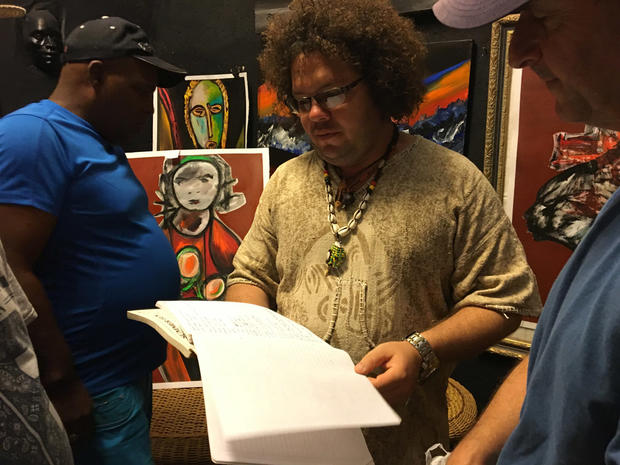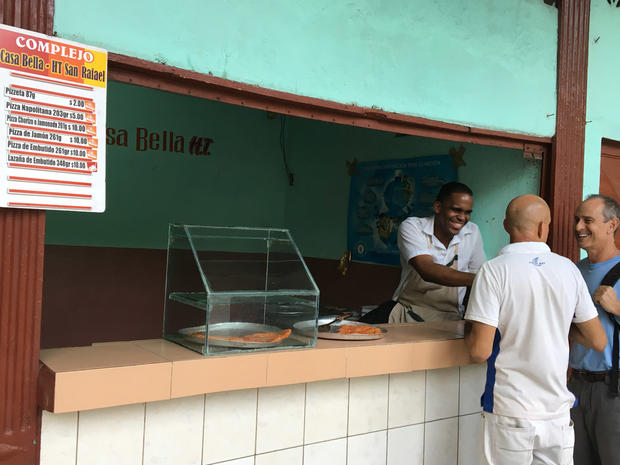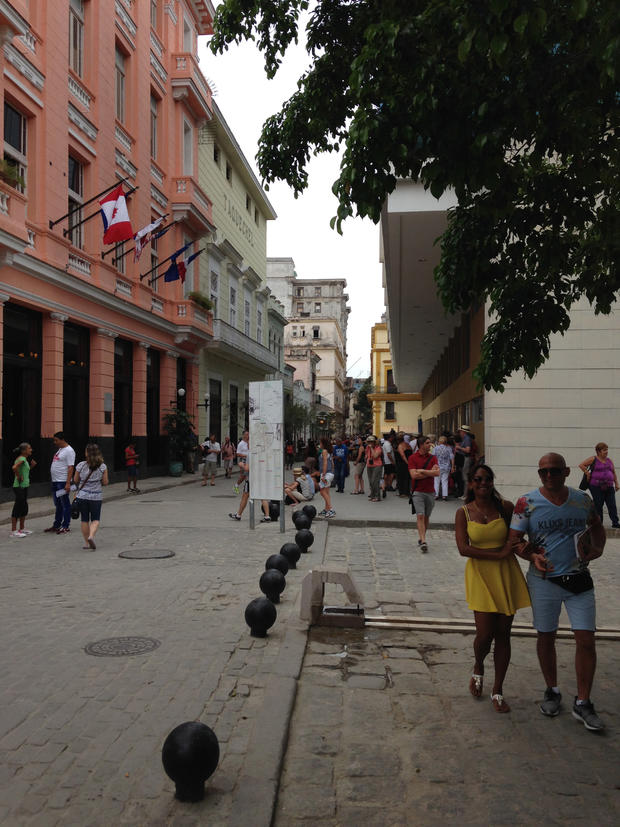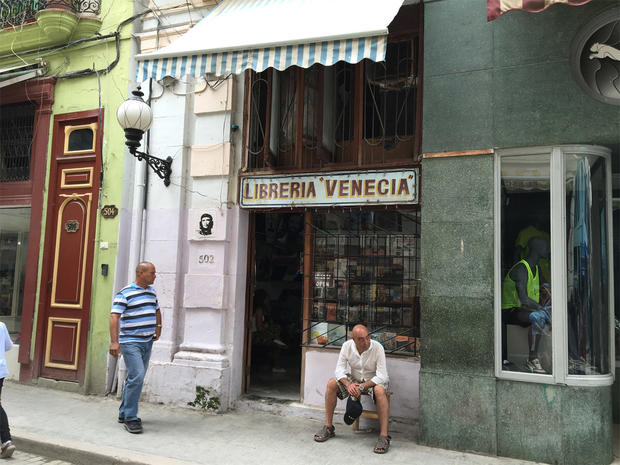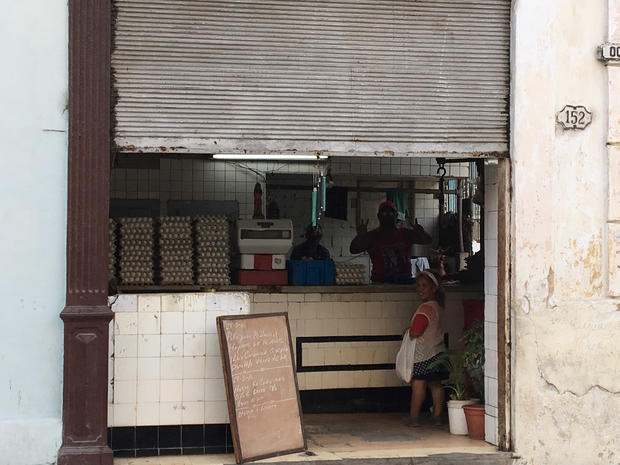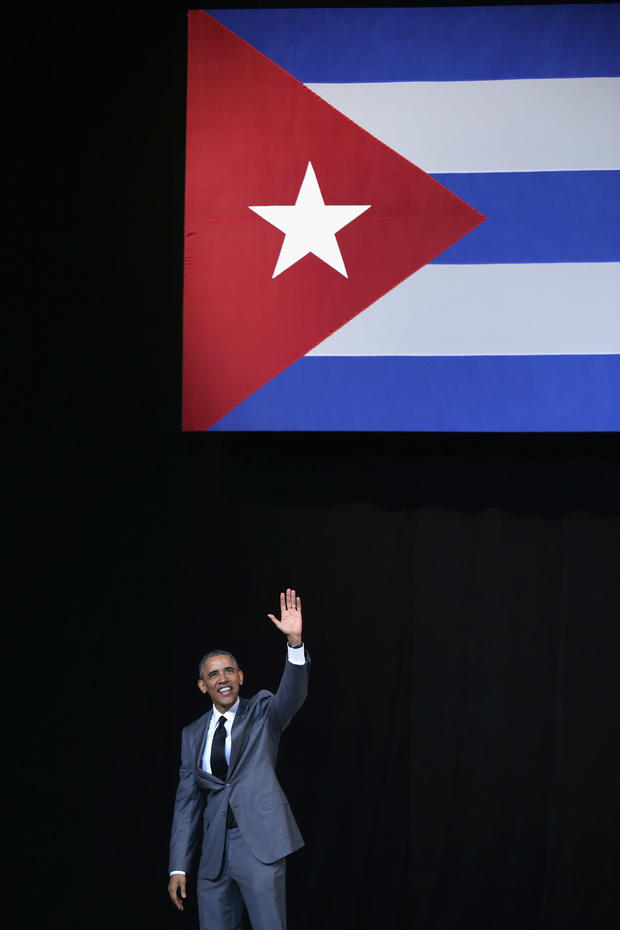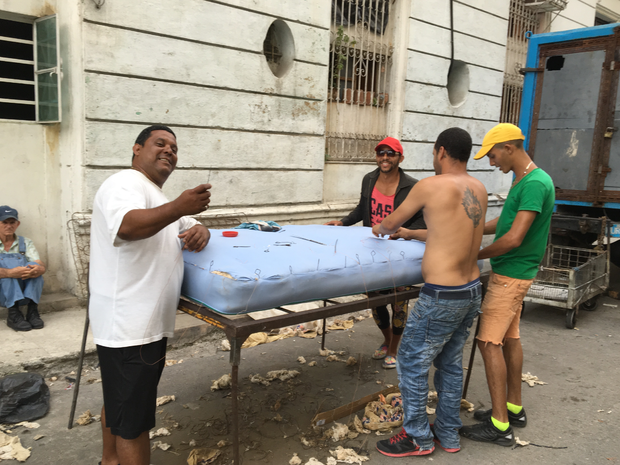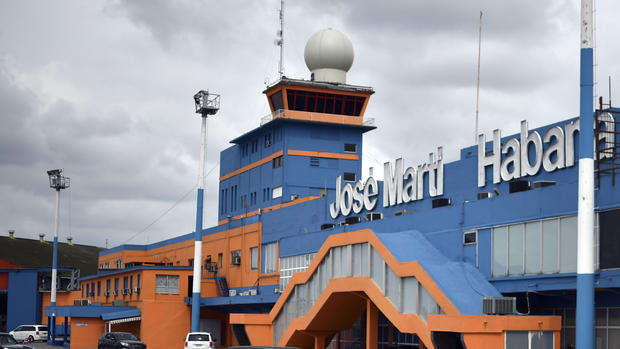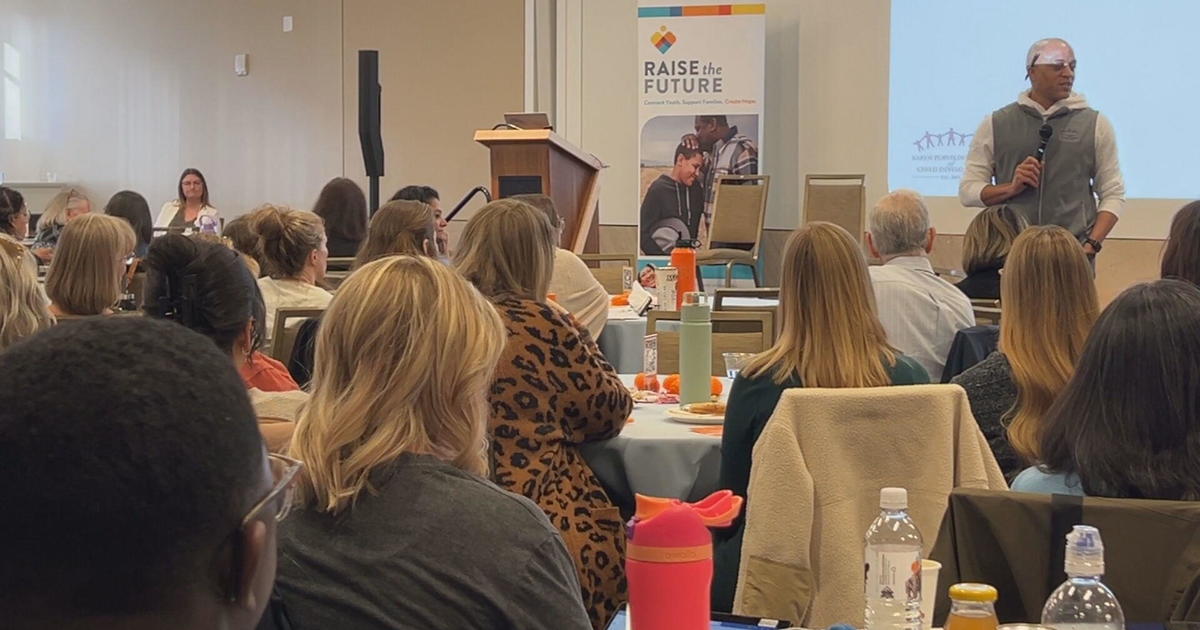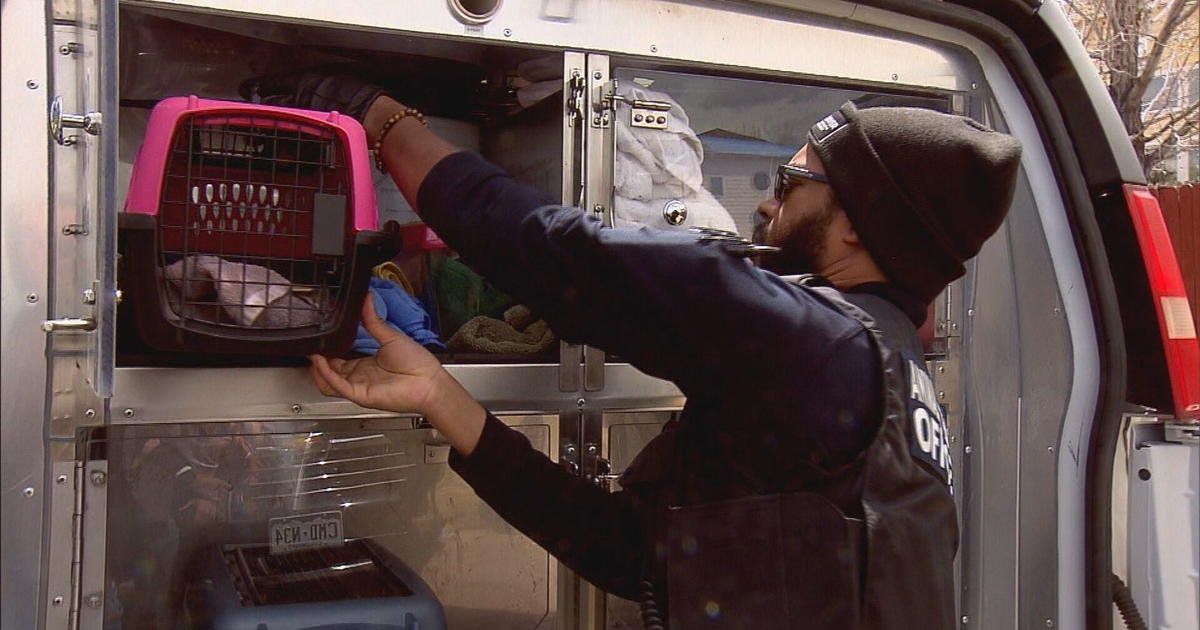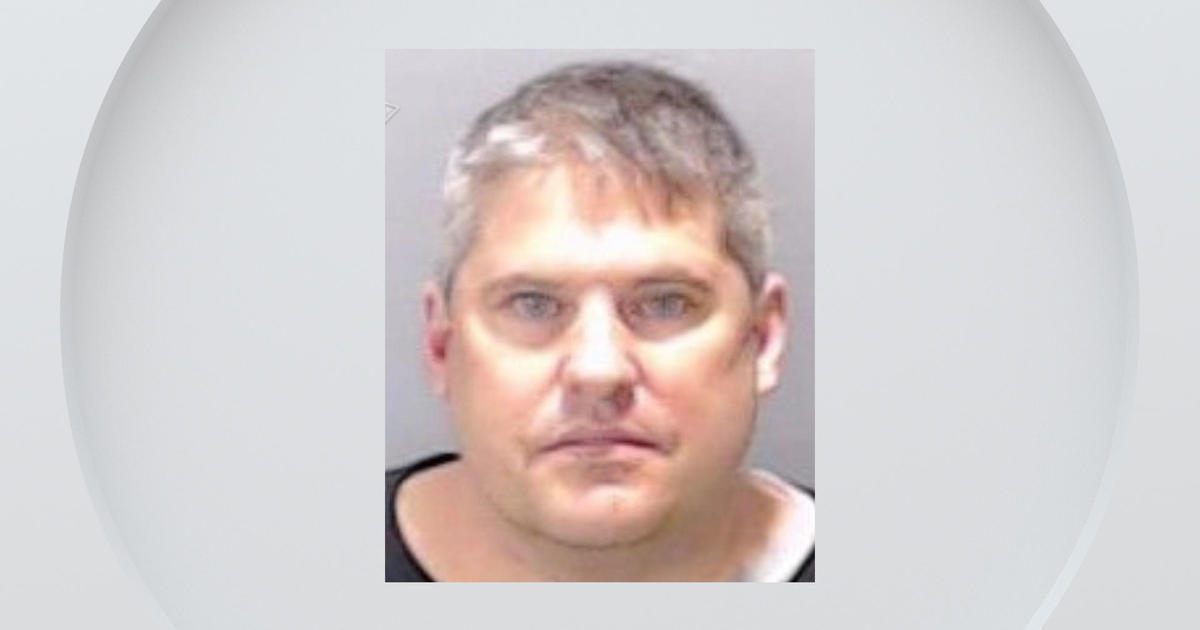From Colorado to Cuba: The Next Revolution
By Brian Maass
HAVANA, Cuba (CBS) - Elias Aseff Alfonso stands out from many of his Cuban countrymen for two reasons: his striking curly auburn hair and his English, which is flawless (although how he learned it, and why, is as unique as his rust colored hair).
Alfonso, who works as an assistant to a prominent Cuban artist, knows the Americans are coming, soon, and wants to be ready. But his English was not learned in a school or classroom, but in more novel ways.
As he chats with visitors from Colorado, Alfonso explains how he taught himself English. From his back pocket he pulls out a carefully folded, half completed crossword puzzle and says through a combination of watching American movies, talking to tourists and filling out American crossword puzzles, he was able to hone his language skills so he can now converse with tourists. That language ability has in turn allowed him to financially thrive in Cuba's tattered economy. Thanks to his ability to speak English and negotiate with tourists, Alfonso says he is making money.
"I have things," he says, but bemoans the fact he has not taken a day off since last August.
His story is emblematic of the change taking root in Cuba; Cubans have slightly more freedom to act as entrepreneurs and make money than they used to.
The kind of resourcefulness displayed by Alfonso was constantly on display during a three day trip to Havana in March, my second visit to Cuba. My first was in 1999.
Cubans have always had little choice but to be resourceful -- they have little in the way of creature comforts, but that soon may change as the U.S. is normalizing relations with the island nation, loosening travel restrictions for the first time since the Cuban revolution in the 1950s.
PHOTO GALLERY: Visiting Cuba
Frontier Airlines is one of nine airlines to apply this year for flights to Cuba. Frontier has applied to fly one daily nonstop flight from Denver International airport to Havana's airport, Jose Marti. A decision on which airlines obtain routes from the U.S to Cuba should emerge from the Department of Transportation later this summer. The Transportation department is expected to approve about 20 daily flights from numerous American airports to multiple Cuban airports.
Everyday Cubans know the Americans are coming, but don't seem to realize how dramatic the influx will be. Likewise, Coloradans planning to get to Cuba in the near future will find a country dramatically lacking in infrastructure and the kind of amenities American tourists have come to expect.
The Castro regime has cleaned up old Havana -- La Vieja Habana, as it is known. It's now filled with beautifully restored buildings, tourist oriented restaurants and hotels, historic and expansive squares, but very few Cubans. Those who are there are generally trying to make a buck off the predominantly European, Canadian and Latin American tourists. Popular tourist attractions like the bars where Ernest Hemingway drank -- La Bodeguita Del Medio and La Floridita -- are now overrun with tourists and all but impossible to get into. But beyond La Vieja Habana, Havana itself is a grimy, noisy, run down city filled with chaos and disarray ... and some of the warmest, most welcoming people you could hope to meet.
On this trip, we stayed in central Havana in what's known as a "Casa Particular," a home where the residents rent out rooms to visitors. We found it via Airbnb. For about $35 a night, we had two rooms that had air conditioning and somewhat reliable hot water. The neighborhood was classic Havana: filled with crumbling buildings, haphazard traffic and a multitude of character and characters, like Manolo Ramirez Laurencio.
One morning he noticed me walking by his first floor apartment and asked if I was lost or needed help -- Cubans are like that: inquisitive and willing to extend a hand and do what they can to assist.
We talked for a minute or two and Manolo mentioned having some aches and pains. I gave him some bottles of aspirin that I had brought along. Basics like medicine and aspirin that we take for granted are rare commodities for Cubans like Manolo. He quickly insisted I stay for a strong cup of Cuban coffee.
Over a cup, he told me he earns about $35 per month as a security guard and described the hand to mouth existence of most Cubans in Havana. Like many, he expressed disappointment in the Cuban economy and subsistence living.
He showed me his empty refrigerator, which had broken down the day before. It looked to be decades old, and Manolo said finding parts and getting it fixed would be extremely difficult and expensive, likely unaffordable for him.
Clothes, he told me, are extremely expensive. A shirt can cost $15, and Manolo said food for his family is more important than clothes.
I was told Cubans are still rationed: five eggs per person per month and one piece of chicken per person per month along with rice, beans and other staples.
Manolo and almost every Cuban we encountered were still buzzing about President Obama's visit to their country in March -- the first by a sitting American President since Calvin Coolidge in 1928.
The Obama visit and all that it implied, along with the thawing of the chill between the U.S. and Cuba, has had a profound effect on the Cuban population.
But Manolo was wistful as he noted how the really lucrative jobs are now in the tourist sector, and without a government connection, those kinds of jobs were impossible to get.
In this neighborhood, a cup of Cuban coffee and a pastry could be had for about a quarter apiece.
If the Cubans on the street noticed their American visitors, they generally did not say anything or make any inquiries.
But there are exceptions, like Ivan, a jovial neighborhood guy who described himself as a physical education teacher at a nearby school. Although perpetually smiling, Ivan said the poor Cuban economy was the nation's biggest problem. As to the Castro family, which has ruled Cuba since the 1950s, he said older Cubans seem to like the Castros while the younger generation does not.
All generations seem to enjoy ice cream, which can be found every block or two, a cool treat to ward off the tropical heat and humidity. One day we ventured to the Vedado neighborhood and sought out the Coppelia ice cream parlor, said to have Cuba's best ice cream. It qualified as the quintessential Cuban experience for Americans.
As we approached, security guards asked where we were from. When we said the U.S., instead of standing in line with hundreds of Cubans in the unrelenting midday sun, we were ushered into an air conditioned room which was nearly empty. There, we were offered a choice: chocolate, vanilla or strawberry.
Although Coppelia ice cream is a source of great pride, it was comparable to low end grocery store ice cream. Say one thing for the Castros -- they understand the idea of coddling foreign tourists.
Our two sons, ages 12 and 10, said what they enjoyed most about Cuba was the people -- outgoing, friendly and warm with quick smiles. An entire population which has every right to be bitter toward Americans and unhappy about their circumstances are anything but that. They recognize and articulate that the issues between Cuba and the U.S. are issues between politicians and governments, but not between the people of the two countries.
It helps to speak a bit of Spanish, as English speakers can be tricky to find outside of the touristy areas. But if you can navigate the language barrier you can learn a lot in a short period of time. Several cab drivers we spoke with said they would be happy to trade places with us for a year. Many Cubans aspire and dream of getting to the United States, but say it's extremely difficult, if not impossible, to get a tourist visa, let alone afford a trip beyond their borders.
From Colorado to Cuba, the next revolution is coming, with the invaders arriving aboard stretch 737s and armed with cellphone cameras and Crocs and anxious to visit this once forbidden land.
Cuba Traveler Tips
- It's fairly easy to fly Denver to Cancun on multiple airlines, then Cancun to Havana in another hour. I would not recommend Cubana Air, the Cuban national airline, as they seem highly unreliable and are prone to cancel flights. For us, Aeromexico was efficient, pricing was competitive at around $300 per person round trip from Cancun to Havana.
- When you arrive at Jose Marti airport in Havana, you will need to change your dollars into the Cuban currency, CUC's or "kooks" as they are called. You can change money at the airport but be forewarned, in addition to the 3 percent service charge, Cuba then charges another 10 percent to change dollars to Cuban currency. So $100 US becomes $87 Cuban. One way around this: Before you get to Cuba, change your US dollars into another currency like Canadian or Mexican. The Cuban government does not levy that 10 percent penalty on those other currencies.
- You can take a taxi from Jose Marti airport to wherever you are staying in Havana. It should cost about $25. In our time in Havana, not once did a taxi driver actually use a meter. Every fare was negotiated up front before you got in the taxi. There is plenty of room to negotiate.
- US credit cards are generally not accepted in Havana. You will need cash.
- You can book accommodations in advance and pay for them by credit card via Airbnb, which is what we did. But it's a bit of a crapshoot. In an effort to accommodate you and capture your business, Cubans will accept your booking but then place you at a different home or apartment if theirs is already occupied. It's not malicious or necessarily a bait and switch, it's just their way of doing business. So specifically ask if the place you are looking at online is going to be the place you will stay.
- It's a good idea and nice goodwill gesture to take plenty of small things that you can discreetly give away. Cubans greatly appreciate anything for kids like small candies or toys or balls for sports. We gave away packs of baseball cards to kids. Adults will graciously accept things like bottles of aspirin or small hotel sized bottles of shampoo and toothpaste. Those kinds of items can be costly for Cubans and hard to find.
CBS4 Investigator Brian Maass has been with the station more than 30 years uncovering waste, fraud and corruption. Follow him on Twitter @Briancbs4.
